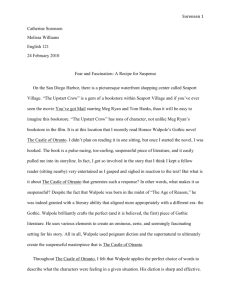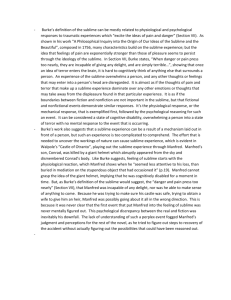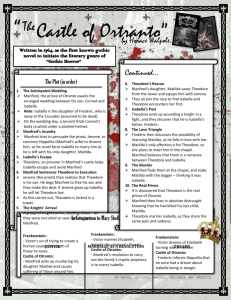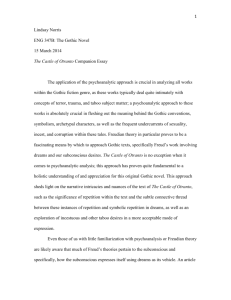CastleofOtrantoFinal2
advertisement
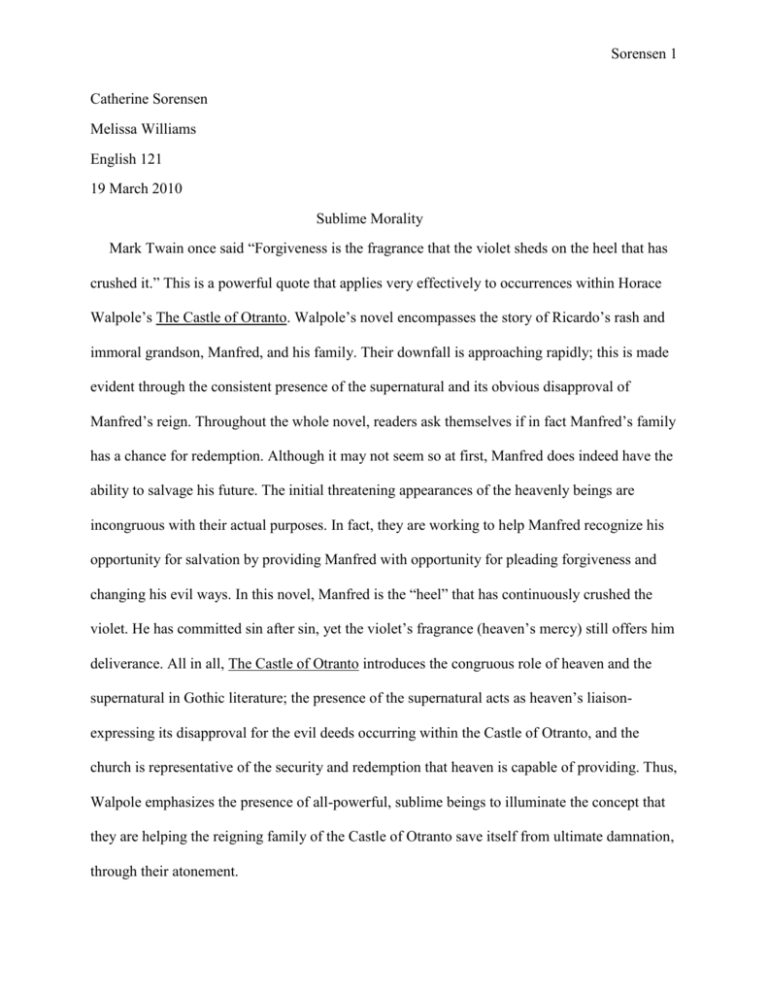
Sorensen 1 Catherine Sorensen Melissa Williams English 121 19 March 2010 Sublime Morality Mark Twain once said “Forgiveness is the fragrance that the violet sheds on the heel that has crushed it.” This is a powerful quote that applies very effectively to occurrences within Horace Walpole’s The Castle of Otranto. Walpole’s novel encompasses the story of Ricardo’s rash and immoral grandson, Manfred, and his family. Their downfall is approaching rapidly; this is made evident through the consistent presence of the supernatural and its obvious disapproval of Manfred’s reign. Throughout the whole novel, readers ask themselves if in fact Manfred’s family has a chance for redemption. Although it may not seem so at first, Manfred does indeed have the ability to salvage his future. The initial threatening appearances of the heavenly beings are incongruous with their actual purposes. In fact, they are working to help Manfred recognize his opportunity for salvation by providing Manfred with opportunity for pleading forgiveness and changing his evil ways. In this novel, Manfred is the “heel” that has continuously crushed the violet. He has committed sin after sin, yet the violet’s fragrance (heaven’s mercy) still offers him deliverance. All in all, The Castle of Otranto introduces the congruous role of heaven and the supernatural in Gothic literature; the presence of the supernatural acts as heaven’s liaisonexpressing its disapproval for the evil deeds occurring within the Castle of Otranto, and the church is representative of the security and redemption that heaven is capable of providing. Thus, Walpole emphasizes the presence of all-powerful, sublime beings to illuminate the concept that they are helping the reigning family of the Castle of Otranto save itself from ultimate damnation, through their atonement. Sorensen 2 David- Michelangelo Buonarroti’s timeless sculpture is the ideal embodiment of the personality and values that David was said to possess. His piercing eyes reveal his steadfast determination and faith in God, and his flawless body is an external representation of his moral perfection- the ideals of loyalty, love and honesty that he possessed. Due to his countless laudable attributes, it is easy to see how David won favor with God. In fact, God established the Davidic Covenant as proof of his fondness for David. In this unconditional covenant, God promised David that a member of his family would always reign as king of Israel. Several years later, however, the covenant was compromised…Solomon, David’s son, was not as loyal and faithful as his father. Indeed, Solomon broke God’s covenant and worshipped other idols. As a result, God decided to punish Solomon by decreeing that the Solomon’s kingdom would be divided after his death. Notice, however, that God did not punish Solomon himself. Instead, God took pity on Solomon in respect to his father- David. In his Gothic novel, The Castle of Otranto, Horace Walpole introduces a very similar story line. In this Gothic masterpiece, Ricardo is a greedy, power-hungry man who poisons the King of Otranto (Alfonso) in order to steal his reign and assume the position as king. Although Ricardo is the evildoer in this scenario, he himself does not get punished. Rather, his family is doomed to damnation while Ricardo’s punishment is bypassed- not unlike Solomon’s situation. These religious parallels introduce the moral standards upheld within the Bible, standards which Walpole maintained in The Castle of Otranto. In doing so, Walpole illuminates heaven’s manner of judgment and its method of punishment. For instance, the future generations of Solomon’s family were not loyal to God (according to the Bible) and they refrained from asking for forgiveness. Thus, they themselves sealed their fate for damnation. Likewise, Manfred was ultimately responsible for his downfall because he never Sorensen 3 made proactive measures to ask for forgiveness and live a virtuous life. The religious parallels are thus indicative of the route that Manfred should have followed to secure his salvation. Moreover, the celestial beings establish a powerful presence in order to emphasize the urgency of their messages. In the final pages of The Castle of Otranto, Alfonso’s spirit makes a paramount appearance to announce his desire for Theodore, “the true heir of Alfonso,” to be the king of Otranto. Similarly, Alfonso ends his declaration with an extravagant demonstration of thunder and thus makes his leave “with a blaze of glory”. His method of departure is almost inconceivable to mortal eyes, and in all its glory it assumes an almost legendary status so that its message is remembered and respected. This “blaze” is representative of the all-powerful and transcendental presence of the supernatural throughout The Castle of Otranto. Like Alfonso, the presence of the other ethereal ghosts and spirits in the novel have the purpose of announcing their favor against Manfred’s household. From the very beginning of the novel, voices are heard throughout the castle, spirits are witnessed roaming the dark corridors, and paintings of family ancestry appear to be breathing. These foreboding spirits create an eerie atmosphere and their presence alone seems to signify Manfred’s unfortunate future. All of these supernatural beings make their presence, however, after an oversized helmet crushes Manfred’s son, Conrad. According to legend, “the castle and lordship of Otranto should pass from the present family, whenever the real owner should be grown too large to inhabit it”. The enormous helmet acts as the first conclusive sign that the castle’s owner has indeed grown too big. The fact that the helmet killed Conrad, is representative of the fated downfall of Manfred’s family, which the spirits evidently advocate (or else the helmet could have landed anywhere else, or on anyone else). These powerful omens and circumstances work as indicators for Manfred to change his Sorensen 4 ways. Essentially, they are warning signs and flashing lights- cautioning Manfred so that he may avoid a disastrous future. Christ as Pantokrator was an established image of God that was prominent in Byzantine art. Pantokrator is a Greek word meaning “All-Powerful” and that is precisely what those images sought to portray: an almighty God. As opposed to depicting God as a loving and nurturing shepherd, the Pantokrator images characterized God in a fearsome and powerful manner. In doing so, the images persuaded God’s followers to avoid sin by instigating their fear in Him. Similarly, the supernatural beings within The Castle of Otranto use fear to reveal their declarations. For instance, as Manfred was discussing his plans to marry Isabella to Jerome (in his attempt to secure his legacy), “three drops of blood fell from the nose of Alfonso’s statue”. Jerome interprets this tenebrous occurrence as the heaven’s disapproval- as a “miraculous indication that the blood of Alfonso will never mix with that of Manfred”. Since the spirits have no desire for Manfred’s reign to continue (quite the opposite) the blood is representative of the spirits’ disapproval for any of Manfred’s efforts to salvage his sovereignty. Walpole seemingly includes the supernatural in a manner that makes what would seem to be irrational, rational. The spirits, the ghosts, the skeletons, and the giants are accepted as real by all the characters in the novel. In other words, their existence is not doubted by anyone. Thus, the supernatural beings essentially become characters in novel, and their opinion is highly regarded by all of the human participants in The Castle of Otranto. All in all, the supernatural beings make their message clear: Manfred and his family will no longer rule Otranto; their immanent fate is bleak unless they take actions to demonstrate their sincere desire for forgiveness. “All men are liable to error; and most men are, in many points, by passion or interest, under temptation to it” this quote, by John Locke, is a very poignant observation of humanity. Indeed, Sorensen 5 everyone is bound to make mistakes, as Alexander Pope said “to err is human”. Mistakes in themselves are not wholly negative events. Rather, mistakes can be learned from and used as experiences for personal growth. As a result, it is important for us, as humans, to learn to forgive. It is not beneficial to hold on to the negative energy of vindictive attitudes or grudges. The bible is filled with countless stories that encourage forgiveness, such as the numerous circumstances where the merciful God forgives the Israelites for their sins. Similarly, heavenly forgiveness is present in The Castle of Otranto. When Ricardo kills Alfonso, he is spared punishment by heaven because he repents. As a result of his guilt, Ricardo ordered the construction of a church and two convents for Otranto and “the sacrifice was accepted”. Thus, Ricardo was not punished; he was offered forgiveness for his actions because he asked for it. Manfred, on the other hand, is repetitively “under temptation” to commit error in his greedy and rapacious desire to salvage his reign. He was willing to kill (to have Theodore put to death), commit incest (marry Isabella) and divorce (punish his loyal and loving wife) in order to secure his legacy. Not once in the novel, however, does Manfred plead forgiveness for his actions. Rather, Manfred’s paranoia and greediness fuel his ambitions and ultimately lead to his destruction. Although the heavens seem intent on Manfred’s destruction, their lack of sympathy are due to the fact that Manfred does not feel remorse for his evil plans. Instead, he doggedly pursues his schemes to ensure their success. Thus, it is evident that forgiveness is a repetitive theme throughout the whole novel. Even as Manfred threatens to kill Theodore in front of his father, Jerome, Theodore tells Manfred “I forgive thee from my soul”. In other words, Theodore is forgiving Manfred for killing him! This scene is representative of Theodore’s pure soul- and it is a primary cause for Theodore’s eventual reign of Otranto. Additionally, Manfred’s daughter, Mathilda, continually provides him with affirmations of her forgiveness after Manfred himself stabbed her. Mathilda tells her mother Sorensen 6 to forgive Manfred too: “ Forgive him, dearest mother- forgive him my death: it was an error”. Mathilda has an angelic soul and she pleads her forgiveness because she does not want her death to negatively impede the family. Such examples of forgiveness (in situations where it almost seems impossible to provide forgiveness) are indicative of the capacity for humans to atone in response to any error (if the one repenting is sincere). Although Manfred did not kill Alfonso, and although he did not actually marry Isabella or kill Theodore, he never made the effort to repent for his evil actions or thoughts. Walpole continuously introduces the concept of forgiveness to introduce the capability that Manfred has to save himself and his family. Throughout the novel, it seems like the supernatural and the heavens are visibly demonstrating their favor for a predestined damnation for Manfred and his family. However, Manfred’s fate is not predestined- he has the power to save himself and his family by recognizing his errors and by humbly repenting for his evil deeds. Unfortunately, Manfred does no such thing and it isn’t until the end, when it is too late, that Manfred turns to God and joins a covenant. The Castle of Otranto is considered by many to be the first Gothic novel in history. Heaven and the supernatural play significant roles throughout the novel and they are essential ingredients in making it the ideal foundation for Gothic literature. Evidently, the essence of the supernatural makes the Castle of Otranto the suspenseful, eerie and unnerving tale that it is. It does, however, serve another function. The seemingly “evil” spirits are actually giving Manfred an opportunity to save himself and his family. Like Solomon’s lineage was destined to damnation, Manfred’s family seems similarly condemned. Little did Manfred know, however, that his future had the potential to be pleasant if he but repented for his sins. As a result, The Castle of Otranto is not just a thrilling masterpiece of Gothic literature, it is also story enriched with moral messagesmore so than ever imagined. Sorensen 7 Work Cited Walpole, Horace. The Castle of Otranto. New Edition. New York: Oxford University Press, 1982. 17-115. Print.
